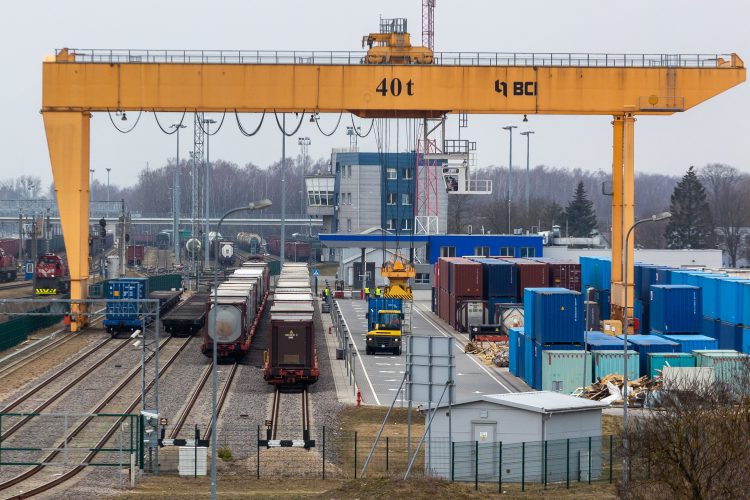LTG Cargo: Intermodal freight saves 66.5 million kilograms of CO2
Posted: 3 April 2024 | Emily Budgen | No comments yet
LTG Cargo, a subsidiary of LTG Group, have saved 66.5 million kilograms of CO2 by using intermodal freight in 2023.


LTG Group’s freight transport company LTG Cargo, together with its clients transporting intermodal freight between Lithuania and the European Union (EU) countries, saved about 66.5 million kilograms of CO2 last year.
During an official ceremony, the company awarded its clients who saved the most carbon dioxide with green certificates confirming CO2 emissions calculations according to the LTG-approved methodology. In total, such certificates were awarded to about 100 companies.
“Last year, we saved 66.5 million kilograms of carbon dioxide by transporting intermodal freight to the West. This is the weight of twenty-six Olympic swimming pools. During the year, 29 million tons of cargo are transported across the Lithuanian-Polish border. It is obvious that the potential of such transportation to reduce the environmental impact of logistics is enormous,” said Eglė Šimė, head of LTG Cargo.
However, these changes require new business habits. We cannot just talk about sustainability for sustainability’s sake, but we need to find solutions to back up logistics transformation with numbers. Therefore, for the second year, we have developed the possibility to provide our intermodal freight customers with certificates confirming CO2e emission savings. They can be used both to ensure that transportation solutions meet customer strategies and to recover part of the taxes in some countries.”
The Baltic market is getting more comfortable with intermodal solutions. By using combined transport, a wider range of logistical challenges of recent years are solved – the impact on the environment, road safety, or extremely dynamic pricing, as well as the lack of drivers.
“Recently, we have seen changes in the sector. More and more businesses are seeing the environmental impact of logistics and listening to the needs of end consumers. Of course, financial incentives (subsidies and tax breaks) or stricter regulation of the logistics sector, as well as efficient, reliable, and environmentally friendly services are important for changes. Investments in railway infrastructure, smooth administrative processes and education of the sector are also necessary.
By cooperating with LTG Cargo, we can offer our clients reliable and sustainable logistics solutions, reduce carbon dioxide emissions and make a positive impact on the environment. Therefore, we consider intermodal routes to the West as very promising in terms of promoting trade and connecting different regions,” notes Jurijs Balaboskins, a member of the board of the Latvian logistics company EFFIMODAL.
By redirecting semi-trailers to last mile transportation, fewer workers would be needed to ensure logistics chains, and those already working in this field could return home the same day after delivering cargo from the intermodal terminal to its destination. Moreover, even individual customer containers can be transported by rail in this way.
“We aim to open up our services to businesses that have not had the opportunity to use our services before. Intermodal freight to the West can be transported in smaller quantities – even one container at a time,” added Eglė Šimė, head of LTG Cargo.
Lithuania joined the intermodal rail freight network in the summer of 2021 with the opening of the Kaunas Intermodal Terminal and the dispatch of the first intermodal train on the 1435 gauge to Europe. Currently, intermodal freight can be transported to Duisburg in Germany, as well as to Slavkov in Poland, and from these terminals to other European countries.
In this way, it is convenient to transport by rail between Lithuania and Western countries not only raw materials needed for industry, but also various types of equipment, furniture, car parts, industrial, household and other everyday goods. It is estimated that each container or semi-trailer transported by rail from Kaunas to Duisburg saves almost 4,000 kilograms of CO2.
Similar certificates are currently being issued in several other European countries. In Germany, businesses can already recover part of the taxes if they choose to transport their goods in ways that comply with the Green Deal. It is expected that by 2030, about 30% more freight transported over 300 km by road will have to be transported by non-polluting transport – primarily intermodal trains.
More Like This
Porterbrook to finance Bletchley depot redevelopment
RBP and RAILPOOL sign rental agreement for Modula hybrid shunting locomotives
Innovators selected for Bristol train station trials
Related topics
Cargo, Freight & Heavy-Haul, Freight, Sustainability/Decarbonisation







